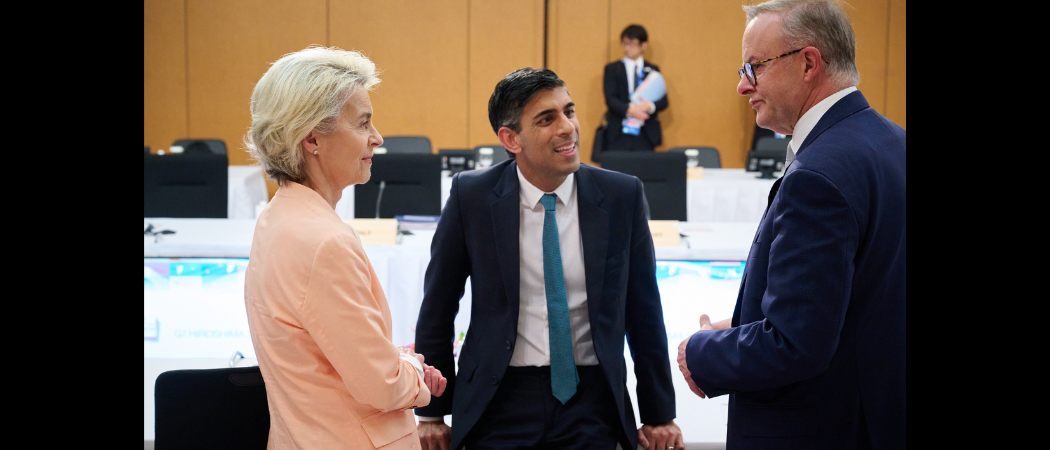As part of the AUKUS security pact, Australia wants to make dual use research collaborations with the US and UK seamless. But new legislation to achieve this goal could seriously hinder work with the EU, universities are warning

From left to right: European Commission President Ursula von der Leyen, UK Prime Minister Rishi Sunak, Australian Prime Minister Anthony Albanese. Photo: Dati Bendo / European Union.
Draft legislation in Australia could “immediately jeopardise” collaborative research with countries outside the US and UK, including the EU, the country’s universities have warned.
Earlier this month, Australia’s Department of Defence unveiled a draft amendment to the existing Defence Trade Controls Act, adding three new wide-ranging offences punishable by up to 10 years in prison for transferring dual use technology without a permit.
The proposals have shocked Australian universities, which have warned that the changes could cut off international exchange and prevent many foreign researchers in Australia from continuing their work, bringing labs to a standstill.
The proposed legislation will “immediately jeopardise a significant proportion of Australia’s ongoing collaborative research projects with partners outside of the US and UK,” warned the umbrella group Universities Australia in its feedback to the government.
The changes are a result of the AUKUS deal, a security partnership between Canberra, London and Washington, signed in 2021 as Australia faces a more assertive and powerful China. Beijing has faced repeated accusations it is illicitly harvesting Australian intellectual property and technology.
The most prominent part of AUKUS is a deal by the US and UK to build Australia new nuclear-powered submarines, a move that infuriated and blindsided France, which had been set to construct this fleet.
But AUKUS has implications far beyond this submarine deal - the idea is to strip away all barriers to dual use research collaboration between the three countries. The proposed Australian legislation would remove the need for any permits when working with US or UK researchers.
This “export licence-free environment” will “encourage industry, higher education and research sectors in all three nations to innovate and cooperate,” according to the Department of Defence.
The flip side of this, however, is that collaboration with other countries is potentially about to become a lot more complex and difficult.
Australia is building a “tall fence around a small paddock”, according to Chennupati Jagadish, president of the Australian Academy of Science (AAS).
“I think it’ll just be more annoying and burdensome to collaborate with EU countries,” said Diarmuid Cooney-O'Donoghue, an international risk manager for Australian universities, who has recently moved to Warwick University in the UK.
“It puts up more barriers, and puts a lot of eggs in two very large baskets – the US and the UK,” he said.
Three new offenses
Researchers in Australia already need permits in some circumstances to supply dual use technology outside the country.
But the new rules would require permits to supply it even within Australia to foreigners, potentially creating enormous confusion and bureaucracy in the country’s internationally-staffed labs over who is allowed use certain technologies.
This could hit global collaboration too, as labs often exchange graduate students as part of their cooperation.
The University of Melbourne has warned that a “large fraction” of its foreign researchers access dual use technologies that would be covered by the rules. “Preventing them from doing so would have the effect of slowing or completely stalling research in a wide range of fields,” it said in its feedback on the changes.
The full list of official sensitive technologies covered by the new legislation runs to hundreds of pages, and includes sections on lasers, gravity meters and optical components.
For example, high performance computers, which are “widely available to researchers at our Melbourne campus”, would be ensnared in the new rules, the university warned.
But the list goes far beyond just physical components, and includes software too. Even delivering a technologically useful company presentation to a group including a citizen from an unauthorised country could be a breach of the new law, according to the Department of Defence.
Jagadish has warned that his own work on nanotechnology and semiconductors would fall foul of the new rules. All his team of researchers are from abroad, with none from the US or UK, meaning they would each need obtain permits and work in a “closed environment” so as not to leak secrets.
The bill could also make scientific conferences a minefield for Australian researchers. “Discussion at international conferences, where unpublished knowledge is shared freely to solve research problems and enable collaboration, seems unlikely if this Bill becomes law,” Jagadish said in a speech earlier this month.
European exemptions
For the first offence of sharing dual use technology with foreigners in Australia without a permit, there’s an exemption for nationals of 25 friendly countries, which includes most EU member states, plus Japan and Canada.
But citizens of the Baltic states, Romania, Cyprus, Malta, Slovakia and Slovenia are not on the list and would be treated like non-Europeans.
And while most European citizens should have an exemption transferring technology while in Australia, they would need a permit to do so while abroad, Melbourne University warned.
The other two offences that would be introduced have no exemptions at all, except for the UK and US.
One is designed to stop dual use technology that has left Australia from being then transferred on to another third country.
But universities are unclear how they can practically stop this kind of unauthorised re-export. This offence may “discourage any international research collaboration outside AUKUS including with like-minded countries,” according to Melbourne University.
Criminalising services
The final new offence criminalises providing services, including assistance and training, related to dual use technologies without a permit, a definition so broad that universities are worried it could impinge on research.
“For example, would these provisions capture knowledge sharing or provision of know how within a research collaboration?” the Australian Technology Network of Universities has asked the government.
All of the new offences would have penalties of up to 10 years in prison. “If a scientist makes a wrong call then they face jail,” the Australian Green Party warned. “There are definitely scientific positives by easing cooperation with UK and US counterparts but this must not come at the expense of walling us off from the rest of the world,” it said.
Without changes, the new rules would force universities to carry out an “unprecedented level of monitoring of their employees, affiliates, research students and academic visitors, and their interactions with citizens of all foreign countries other than the US and UK,” according to the University of Sydney, it its feedback to the government.
Mitigating disruption
For now, the new rules are just a draft, and universities are busy lobbying for new exemptions and clarifications that they hope will mitigate any disruption.
In particular, they want an expanded carve out for “fundamental research” covering applied as well as basic research where results end up in the public domain.
If this was included, the changes could actually make research collaboration with the EU easier, because it would be an improvement on the current exemption, said a policy adviser at an Australian university, speaking on condition of anonymity.
But even if the new rules are watered down, there’s concern that they signal to Australian researchers that the UK and US are now the government’s preferred partners on sensitive technology.
“I doubt you’d get thrown in jail for exporting something to Germany or France,” said Cooney-O'Donoghue. “I just think the message is that the government wants heavy collaboration with the US and the UK, and is potentially willing to sacrifice collaboration with other parties.”
Despite the furore among Australian universities, some seem content with this trade-off. The new rules “might mean restricting or giving up other opportunities,” the Australian Technology Network of Universities said in its feedback, “but the government should be prepared to make difficult decisions about this.”
As for the European Commission, it isn’t saying anything publicly for now. “We understand that the Defence Trade Controls Amendment Bill 2023 is currently still a draft. We have no comment,” a spokesperson said.
Australia is still in theory on the Commission’s list of countries that could associate to Horizon Europe, the EU’s €95 billion research and innovation programme, but talks are yet to get off the ground.
Asked about the impact of the new rules, Australia’s Department of Industry, Science and Resources stressed existing links with the EU.
“Australia and the European Union share an ambitious industrial strategy and significant and growing investments in critical technologies, such as quantum, AI and semiconductors, and research and innovation more broadly,” a spokesperson said.





 A unique international forum for public research organisations and companies to connect their external engagement with strategic interests around their R&D system.
A unique international forum for public research organisations and companies to connect their external engagement with strategic interests around their R&D system.